英译汉常用的方法和技巧(广东省佛山市高明区)
文档属性
| 名称 | 英译汉常用的方法和技巧(广东省佛山市高明区) |
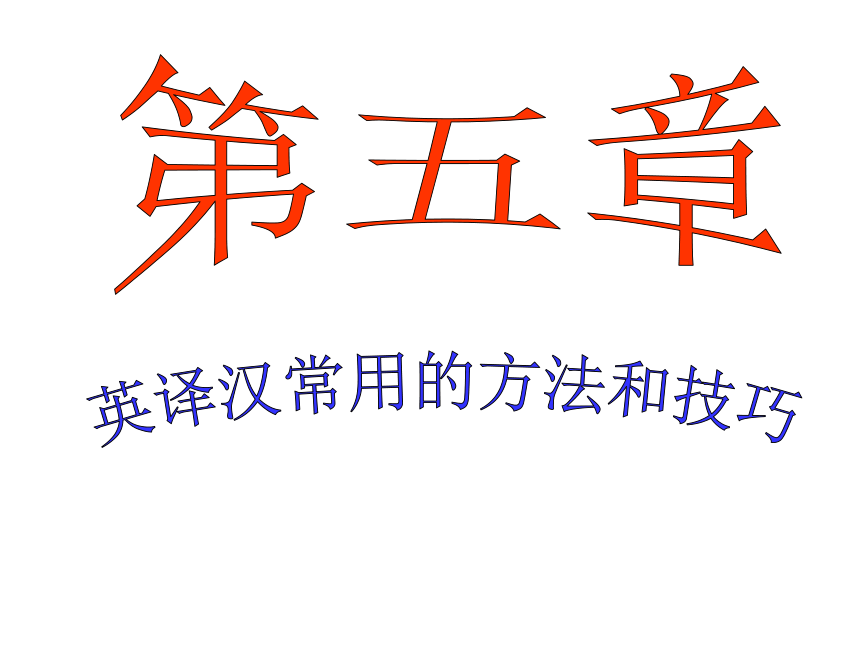
|
|
| 格式 | rar | ||
| 文件大小 | 27.3KB | ||
| 资源类型 | 教案 | ||
| 版本资源 | 通用版 | ||
| 科目 | 英语 | ||
| 更新时间 | 2008-10-30 00:00:00 | ||
图片预览

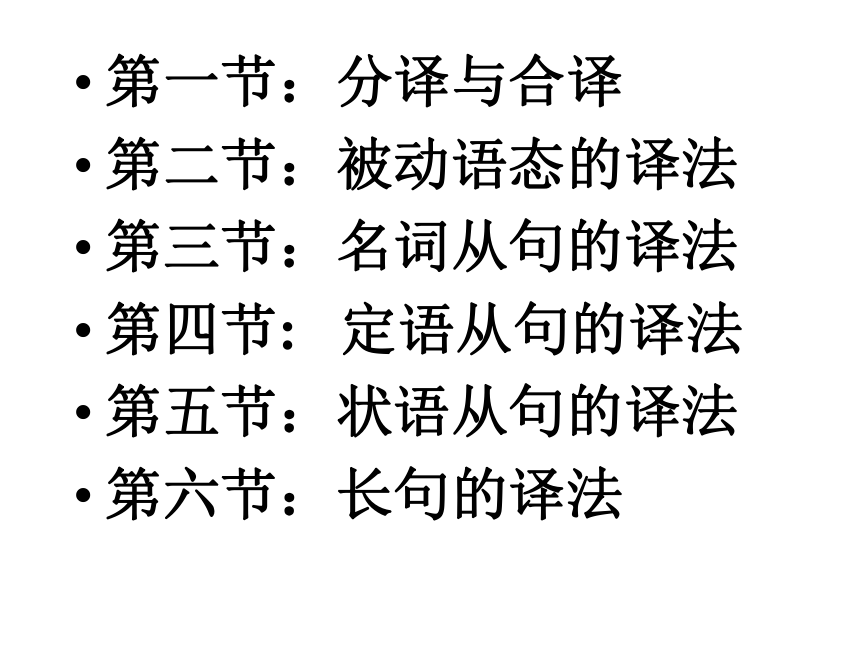
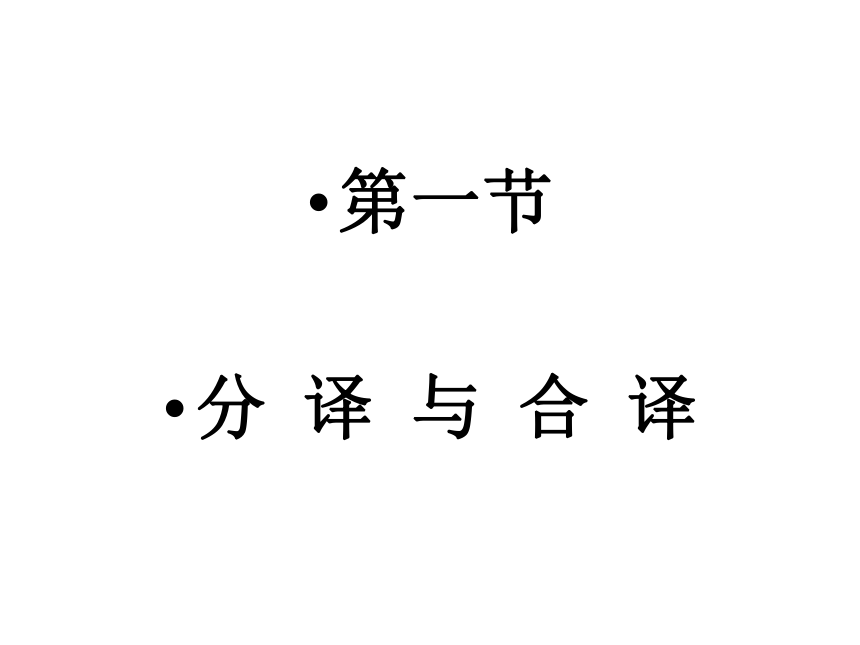
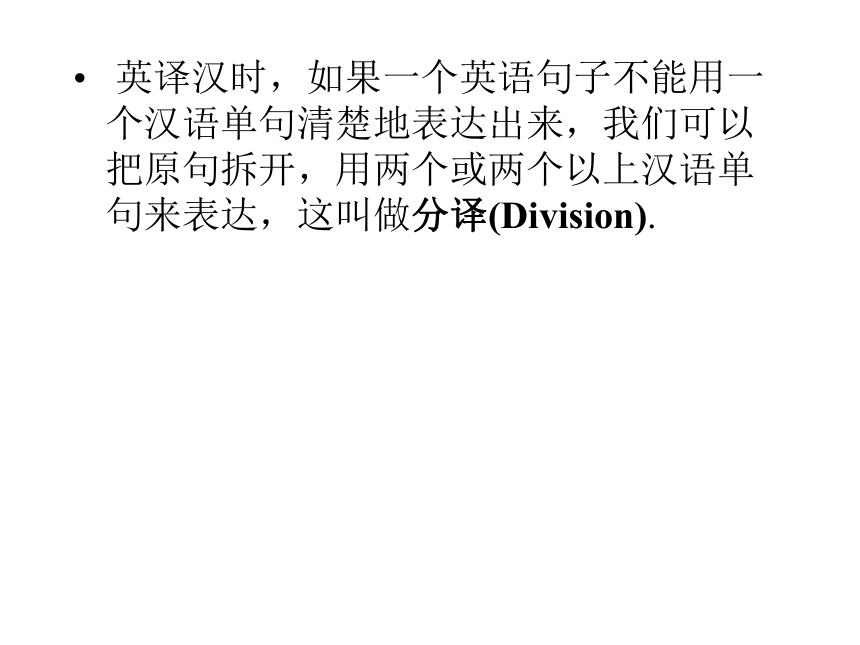
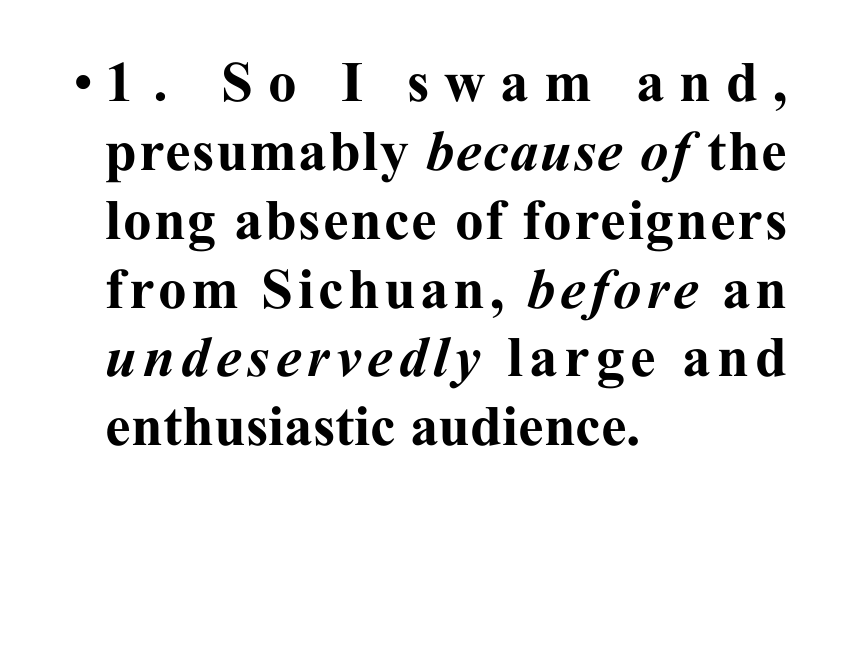
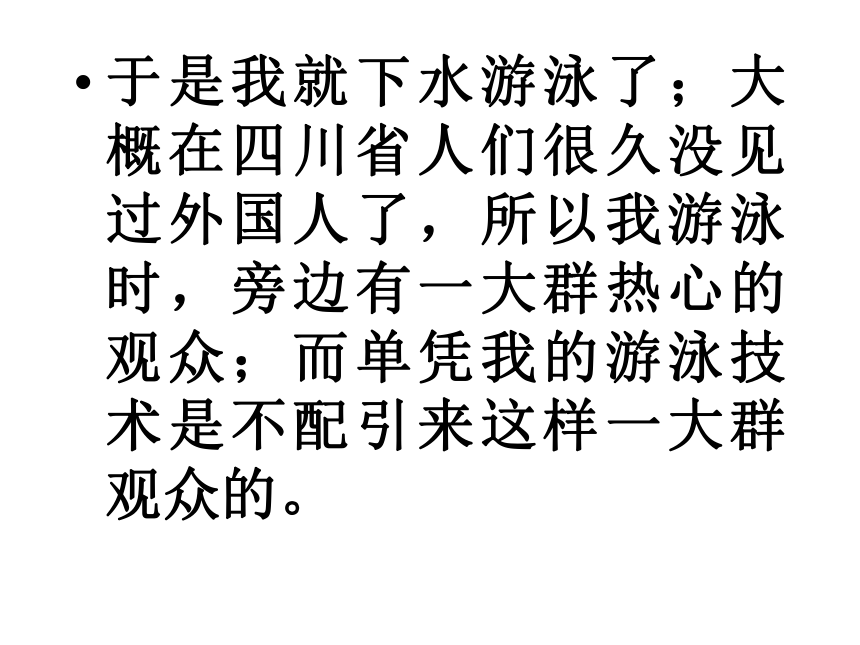
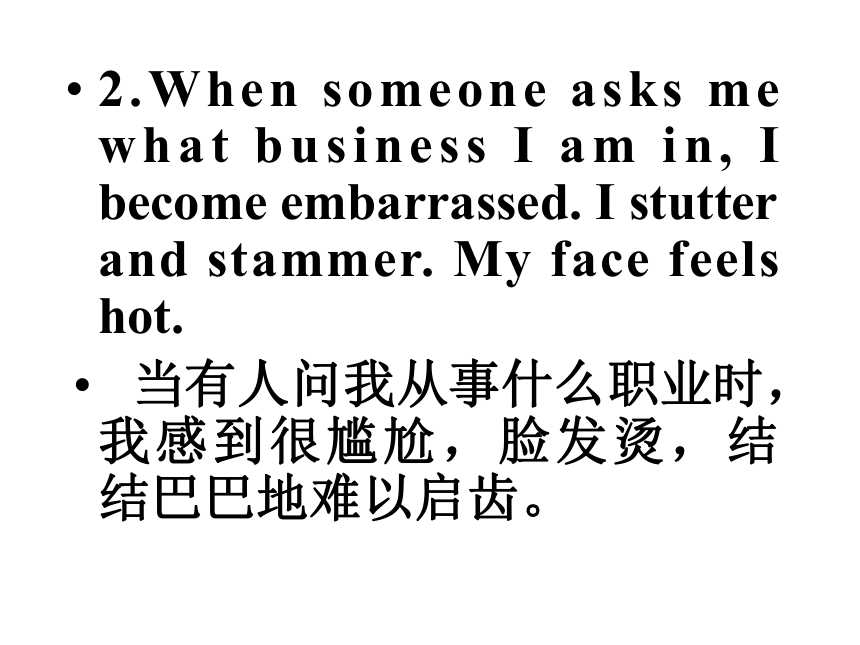
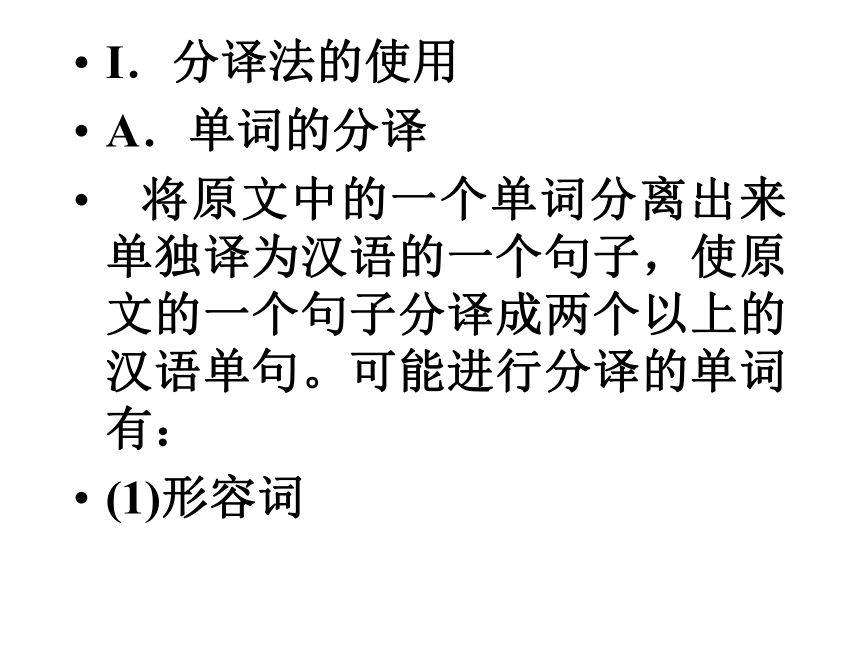
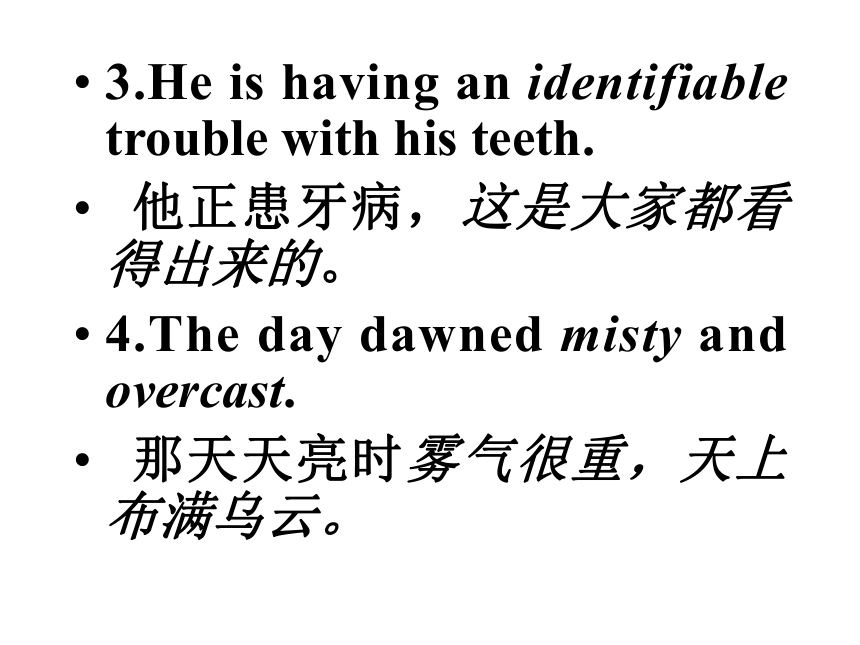
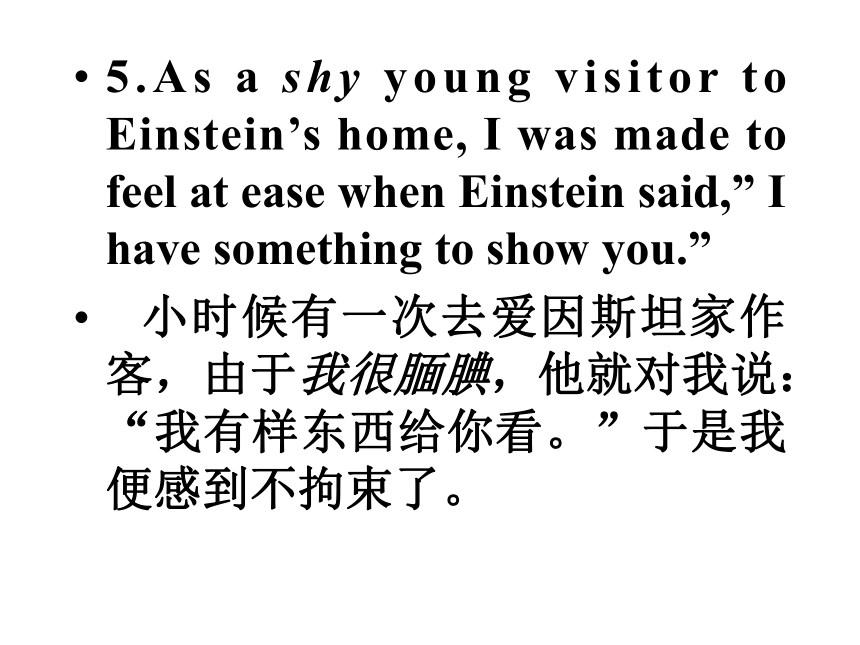

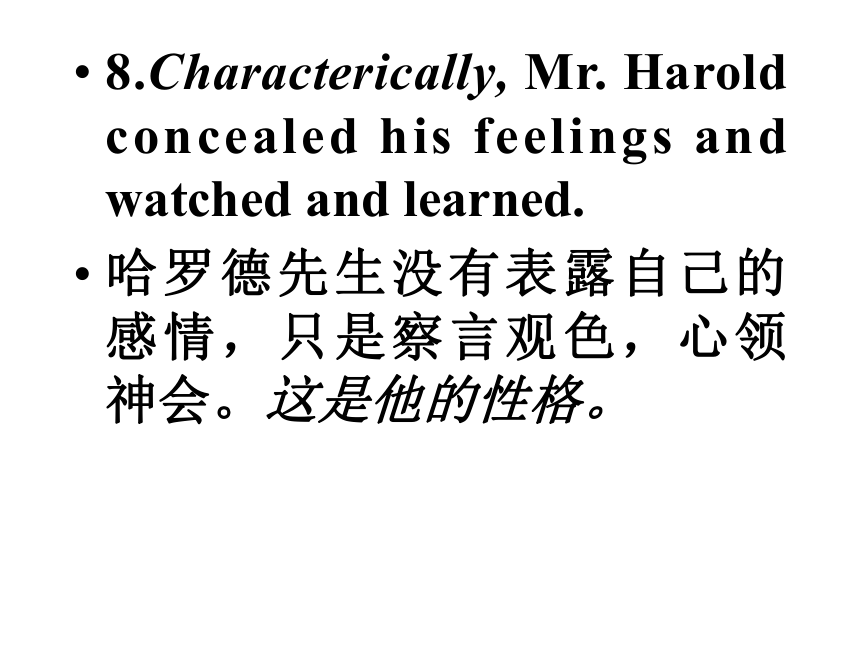
文档简介
课件133张PPT。第五章英译汉常用的方法和技巧第一节:分译与合译
第二节:被动语态的译法
第三节:名词从句的译法
第四节: 定语从句的译法
第五节:状语从句的译法
第六节:长句的译法
第一节
分 译 与 合 译 英译汉时,如果一个英语句子不能用一个汉语单句清楚地表达出来,我们可以把原句拆开,用两个或两个以上汉语单句来表达,这叫做分译(Division). 1.So I swam and, presumably because of the long absence of foreigners from Sichuan, before an undeservedly large and enthusiastic audience.于是我就下水游泳了;大概在四川省人们很久没见过外国人了,所以我游泳时,旁边有一大群热心的观众;而单凭我的游泳技术是不配引来这样一大群观众的。
2.When someone asks me what business I am in, I become embarrassed. I stutter and stammer. My face feels hot.
当有人问我从事什么职业时,我感到很尴尬,脸发烫,结结巴巴地难以启齿。
I.分译法的使用
A.单词的分译
将原文中的一个单词分离出来单独译为汉语的一个句子,使原文的一个句子分译成两个以上的汉语单句。可能进行分译的单词有:
(1)形容词
3.He is having an identifiable trouble with his teeth.
他正患牙病,这是大家都看得出来的。
4.The day dawned misty and overcast.
那天天亮时雾气很重,天上布满乌云。
5.As a shy young visitor to Einstein’s home, I was made to feel at ease when Einstein said,” I have something to show you.”
小时候有一次去爱因斯坦家作客,由于我很腼腆,他就对我说:“我有样东西给你看。”于是我便感到不拘束了。
(2)副词
6.Frankly, are you interested in going?
你说实话,有兴趣吗?
7.Not surprisingly, those who were praised improved dramatically.
那些受到表扬的人进步显著,这是不足为怪的。
8.Characterically, Mr. Harold concealed his feelings and watched and learned.
哈罗德先生没有表露自己的感情,只是察言观色,心领神会。这是他的性格。
(3)动词
9.We recognize and share China’s resolve to resist the attempts of any nation which seeks to establish global or regional hegemony.
我们认识到中国决心抵抗任何国家寻求建立全球霸权和地区霸权的企图,我们也有这样的决心。
(4)名词
10.She left home a child and came back a mother of three children.
离家时她还是个孩子,回来时已是三个孩子的妈妈了。
11.As a secret training base for a revolutionary new plane, it was an excellent site, its remoteness effectively masking its activity.
作为新型飞机的训练基地,这是一个非常理想的地方;因为它地处边陲,人们不容易了解其中的活动。
B.短语分译
将原文中的一个短语译为一个句子,使原文的一个句子分译成两个或两个以上的汉语句子。可能进行分译的短语有:
?(1)分词短语
12.He was dressed, sitting by the fire, looking a very sick and miserable boy of nine years.
他已穿好衣服,坐在火炉旁。这个9岁的男孩看上去病得很厉害,一副可怜巴巴的模样。
13.He handed me my draft of the plan completely modified.
他把我的计划草案交还了我,内容全改动了。
(2)介词短语
14.The fire started during the workmen’s dinner hour.
工人们吃饭时,发生了火灾。
15.With all his faults, I like him.
尽管他有种种缺点,我还是喜欢他。
(3)名词短语
16.Alice, normally a timid girl, argued heatedly with them about it.
阿丽丝平时是个腼腆的姑娘,现在也和他们热烈地辩论起来。
17.You should consult your advisor, Dr. John H. Olson, Room 125D Science Wing, Phone 715 232-2604, concerning the planning of your program.
你应找你的指导教师约翰.H.奥尔森博士商量你的计划。他在理科侧楼125D房间,电话是715232-2604。
C.长句分译
长句分译这里主要是指将含有一个或多个定语从句的英语长句分译为两个或多个汉语句子。
18.But underneath the sympathetic talk, they actually feel a little wistful envy of the men who brave the winds, rain, snow, cold, and storms upon the restless water.
然而,在这种富于同情的闲聊下面,他们实际上都有着一种强烈的羡慕之情;他们羡慕那些在惊涛骇浪中搏风斗雨、傲雪顶寒的人们。
19.A spirited discussion springs up between a young girl who says that women have outgrown the jumping-on-a-chair-at-the-sight-of-a-mouse era and a major who says that they haven’t.
一位年轻女士与一位少校展开了热烈的讨论。年轻女士认为,妇女已经有所进步,不再像过去那样一见到老鼠就吓得跳到椅子上,少校则不以为然。
20.We have nothing to do with David Swan until we find him at the age of twenty on the main road from his home to the City of Boston where his uncle, a businessman, is going to give him work in the store which he owns.
我们与戴维.斯旺本来毫无关系。直到有一天,我们见到20岁的他离家上了大路,去波士顿他舅舅家。他舅舅是做生意的,开了个店,安排他去那里做事。
II.合译法的使用
A.将两个或两个以上的英语简单句合译为一个汉语单句
21.It was 2 a.m. on a hot August night. In a San Francisco suburb, a man staggered out of a bar.
一个炎热的8月夜晚凌晨两点钟,在旧金山郊区,有个人摇摇晃晃的走出酒吧间。
22.People are the same everywhere. They are born. They are babies. They are children. They are adults. They grow old. They die.
各地的人都是一样的。人们生下来都要经历从婴儿、儿童、成年人直至衰老死亡的各个人生阶段。
B.将英语的并列句合译为汉语单句
23.Her dress was grey and plain, but it fitted her body nicely.
她一身素装简单而合身。
?
C.将英语的主从复合句译为汉语单句
24.That’s the only thing we can do now.
目前我们只能这样做。
25.That’s why you should put one item of information on each of information card.
因而每张资料卡上只应记一条资料。
D.将两个或两个以上的英语简单句合译为汉语的一个联合复句
26.Pitcher was a quiet man. He didn’t usually let his face show his feelings.
皮切尔不爱说话,也不轻易在脸上显露喜怒哀乐。
第二节
被 动 语 态 的 译 法
I.英语被动语态的用法
英语中被动语态的使用比汉语较为普遍。英语句子在下列情况下一般使用被动语态:
A.不必或者无法说明主动者是谁
1.This book has been translated into several foreign language.
该书已经译成了好几种外国语言。
B.谈话的中心是承受者而不是主动者
2.The machine here are all made in China.
这儿的所有机器都是中国制造的。
C.出于礼貌,不愿说明谁是主动者
3.I’m flattered.
你过奖了。(不可译成:我受到了奉承。)
D.为了使句子易于安排
4.Unfortunately, their plan failed and we mercilessly criticized by their opponents.
不幸的是,他们的计划失败了,并且遭到了反对者们的批评。
II.被动语态的译法
?A.汉语的被动语态一般带有“被”、“受”、“由”等词。有时英文原句的被动语踏可以译成带有“被”、“受”、“由”等词的汉语被动结构
5.Both the father and the son were thrown into prison.
父子倆都被投进了监狱。
6.Wherever she went, the princess was welcomed with great enthusiasm.
无论走到哪儿,公主都受到非常热烈的欢迎。
7.The children were taken care of by their grandparents when we were away.
当我们不在时,孩子们由他们的祖父母照看。
B.应该注意绝不可以滥用“被”字
如,This book was written in 1912.不可译成“这本书是1912年被写的”,而译成“这本书写于1912年较妥。所以,在许多情况下,应该用其他形式来翻译英文的被动语态。
(1)译成主动式
8.This project should be finished as soon as possible.
这项工程应该尽早完成。
9.This must be made clear to everybody.
这一点必须向大家讲明白。
10.This issue is not much talked about in China.
在中国(人们)很少谈论这个问题。
11.She is dressed in red.
她身穿红色的衣服。
12.We are convinced that our team will win.
我们相信我对讲获胜。
13.The gun is loaded.
枪装有子弹。
14.The gun was quickly loaded again.
枪很快又被装上了子弹。15.University of Electronic Science and Technology of China is located in the eastern part of Chengdu City.
电子科技大学位于成都市的东部。
(2)译成无主语的句子
16.Smoking (is) prohibited.
严禁吸烟。
?
17.It is said that the old man is a millionaire.
据说那老头是个百万富翁。
18.It is well known that Hong Kong has been part of China since ancient times.
众所周知(大家知道)香港自古就是中国的一部分。
It is reported that…
据报…
It is supposed that…
据推测…
It is hoped that…
希望…
It must be pointed out that…
必须指出…
It must be admitted that… 必须承认…
It is believed that… 有人相信…
It is generally considered that… 大家认为… It will be said that… 有人会说…
It was told that… 有人曾说…
(3)译成其他特定的汉语句型
19.We were very much impressed by what she had said.
我们为她的言语深深打动。20.Everybody in the room was shocked by his thundering voice.
他那雷鸣般的嗓音把房间里所有的人惊呆了。
21.The downtown area of Tokyo was practically destroyed by the earthquake.
地震几乎使东京城区完全毁灭。22.They got married last Sunday.
他们上个星期天结了婚。
23.Jack got caught slipping a note to Lisa during the exam.
在考试过程中杰克向莉萨递条子时被发现了。
第三节
名 词 从 句 的 译 法
I.主语从句的译法
含主语从句的句型有
1)“主语从句+主句谓语+其他成分”;
2) “形式主语it+主句谓语+主语从句”。
A.??? 上述第一种句型一般用顺译法
?1.That she survived the earthquake is sheer luck.
她在地震中幸免于难纯靠运气。
2.Who ever breaks the regulations deserves a fine.
违规者应予罚款。
3.Which result is correct remains to be studied.
哪个结果正确,还有待研究。
4.What little she said has left us much to think about.
她说的短短几句话很发人深思。
5.That he was in error will scarcely be disputed by his warmest friends.
他弄错了,而他那些真诚的朋友对此不会提出质疑 B.翻译第二种句型的句子,除需省译形式主语it外,还需根据汉语的表达习惯,有的用顺译,有的用倒译,有的两者均可,有时主从合译
(1)顺译
6.It hasn’t been made clear when the new expressway is to be opened to traffic.
还不清楚新高速公路什么时候通车。
7.It occurred to him that he had forgotten to take his notebook with him.
他突然想起他忘了带笔记本了。
(2)倒译
8.It doesn’t matter where we are going on holiday.
我们去哪儿渡假都没关系。
9.Has it been announced when the planes are to take off?
飞机什么时候起飞播报了没有? (3)顺译或倒译,两者均可
10.It is common knowledge that the whale is not a fish.
众所周知,鲸不是鱼。
或:鲸不是鱼,这是众所周知的。?
(4)主从合译
11.It is probable that he has got the clue for solving the problem.
他很可能已找到解决这个问题的线索。
12.It seems that that datum is quite convincing.
这个数据似乎很有说服力。
It is advisable that…
…是可能的
It is desirable that…
最好是…
It is evident that…
很明显(或显然)…
It is noteworthy that…
值得注意的是…
It is assumed that…
假定…
It cannot be denied that…
无可否认的是…
It is preferred that…
最好…
It is reported that…
据报道…
It is said that…
据说…
It can be seen from this that…
由此可见…
It is well-known that…
众所周知…
It is a fact that…
事实上…
It is no wonder that…
难怪…
II.表语从句的译法
A.翻译表语从句一般用顺译法
13.This is what we are firmly against.
这是我们坚决反对的。
14.Things are not always as they seem to be.
事物并不总是像表面上看来的那样。
15.That is why we decided to put the discussion off.
这就是我们坚决推迟讨论的原因。
B.有时可将主从句合译
16.There is no air and water on the moon. That’s why no living things can live there.
月球上没有空气和水。因此生物在月球上不能生存。
17.That was how they were defeated.
?他们就是这样给打败的。
C.有时可用倒译
18.Raw material is what we are badly in need of.
我们急需的是原料。
III.宾语从句的译法
A.英语的宾语从句有三种:翻译宾语从句一般都用顺译法
19.I can’t make out what they are talking about.
我不清楚他们在谈什么。
20.She reminded me that I had a meeting to attend that evening.
她提醒我晚上要参加一个会议。
21.He was not conscious of what an important discovery he had made.
他没意识到他的这一发现多么重要。
22.You may be sure that he is honest.
你可以相信他是诚实的。
23.We are certain that we’ll be able to accomplish the designing in a short period of time.
我们肯定能在短期内完成这项设计。
B.介词宾语从句若位为位于句首,有时根据汉语习惯,采用倒译法
24.Did she say anything about how the work was to be done?
关于这项工作该怎么做她说了什么没有?
C.英语中有时用it作形式宾语,而把宾语从句放在句末。译成汉语时,应将形式宾语省译,而宾语从句则按汉语表达习惯要么用倒译要么用顺译
25.We all thought it a pity that the conference should have been cancelled.
会议取消了,我们都感到遗憾。26.The teacher made it clear to the students that they must hand in their compositions by Friday.
老师给学生讲清楚了,必须在星期五以前交作文。?
IV.同位语从句的译法
?A.用顺译法将同位语从句译为汉语的独立句,并根据具体情况在前面加冒号、破折号或加“即”等表同位关系的词
27.Then arose the question where we were to get the materials needed
于是就产生了这样一个问题:我们到哪里去找所需要的材料。
28.In July 1898, Madame Curie and her husband got a great success that they discovered the radioactive element, polonium.
1898年7月,居里夫人和她的丈夫获得了很大的成功—他们发现了放射性元素钋。
29.The name “volcano” indicates the belief of the ancient Greeks that the burning hills of the Mediterranean were the workshops of divine blacksmith, Vulcan.
“火山”这一名称表明古希腊人的这一信念,即地中海沿岸大燃烧着的上是锻冶之神“伍尔坎”的工场。
30.Can you produce any evidence that he was not at home that night?
你能不能提出证据,证明那天夜里他不在家。
?
B.用倒译法将同位语从句译为前置修饰语
?31.?? There was little probability that they would succeed.
他们成功的可能性极小。
32.??? Any proposals that John should be dismissed must be resisted.
必须抵制将约翰开除的任何提议。
C.用转换法将同位与从句转译为汉语的复合结构作宾语
33.This thought came to him that maybe he had left his keys in the bedroom.
他突然想起他可能把钥匙遗忘在卧室里了。
34.Is this not another proof that the so-called détente is just empty talk?
这难道不又一次证明所谓缓和只不过是句空话。
35.He gave the order that all the prisoners be set free.
他命令释放所有的犯人。
36.The story goes that the expedition was a failure.
据说这次远征失败了。
第四节
定 语 从 句 的 译 法
I.定语从句常用的翻译方法
A.倒译法对限制性和非限制性定语从句都适用,不过更多地用于不太复杂的限制性定语从句
1.Those who want to go please sign their names here.
想去的人请在这儿签名。
2.James Russll is a man for whom I have the greatest respect.
詹姆斯.罗索是我最尊重的人。
3.Go back further, to a world where the steam engine and allied inventions had not yet enabled industrialization.
再进一步往回想,就回到一个蒸汽机及相关的发明尚未导致工业革命的世界。
4.The way you answered the questions was admirable.
你回答问题的方式(或你回答得)真是妙极了。
5.The speech, which he had written on little bits of paper, seemed endless.
他那事先写在小纸片上的发言稿念起来好像没完没了。
?
B. 分译法
?当定语从句较长,或先行词有较多的前置定语时,若再将定语从句倒译为前置定语,可能会使译文条理不明,含义不清。在这种情况下,把定语从句分译为单独的句子却能避免这些弊病。翻译限制性和非限制性定语从句都可能用到分译法,但这种方法更多地适用于非限定性定语从句。使用分译法有两种形式:重复关系代词所指代的含义和省译关系词。
(1)重复关系词所指代的含义
6.He is with his youngest brother, who is accompanying him on his tour in China.
他和他的小弟弟在一起。他的小弟弟正陪同他在中国旅游。
7.I have to book ahead for concerts, which are usually held in London.
我得预购音乐会的票。这些音乐会通常在伦敦举行。
8.The critical value is expressed as =(S-1)(1-P) where S is specific gravity of material, P is percentage of voids in material expressed as a decimal.
这一临界值可表示为:=(S-1)(1-P)式中S为材料比重;P为材料的空隙百分比,以小数表示。(关系副词where引导的定语从句修饰上面的整个公式,所以where 译为“式中”)
9.The Tartar chief controls a thousand men, all of whom must obey his orders in both war and peace.
鞑靼人的头目控制着1000人,这1000人在战争和和平时期都必须服从他的命令。
10. I’m looking at a photograph of New Orlean’s jazz group which I used to play in.
我在看一张新奥尔良爵士乐的照片。我以前一直是该乐队的成员。
(2)省译关系词
11.Isaac Asimov was a productive writer who wrote over two hundred books all his life.
艾萨克﹒阿西莫夫是一位多产作家,一生写了200多本书。
12.He said that he liked reading, which I was glad to hear.
他说他喜欢读书,我听了感到很高兴。
13.On the ground floor he had a store where he sold canned goods.
他在底楼有个铺子,出售罐头制品。
C. 主从合译法
有时我们可以将英语的主句和定语从句压缩译成汉语的一个单句。原文的主句在译文中被压缩成汉语单句的一个句子成分。适用于这种译法的多数是主句为there be句型的英语句子。
14.There are many foreign tourists who want to visit the Great Wall.
许多外国旅游者想游览长城。
15.There is no reason why he shouldn’t come.
他没有不来的理由。
16.He has been suffering from al kind of disease for which the cure is possible.
他得的那种病是可以治疗的。
17.That was the way she looked after us.’
她就是这样照顾我们的。
II.句法结构特殊的定语从句的辨认与译法
?A. 分隔型定语从句
?定语从句与先行词分隔往往是由以下几种情况造成的。这类定语从句常常倒译为前置定语。 (1)先行词与定语从句之间有另一个作定语的短语
18.He lived in the house near us which was wrecked.
他住在我们附近的一座破房子里。19.There is no habit so old but may(=that may not) be cured by a strong willpower.
只要有坚强的毅力,没有什么改不了的旧习惯。
?
(2)句子的状语较短,而修饰宾语的定语从句较长
20.I put the books in the cupboard which you read yesterday.
我把你昨天读过的那些书放在橱柜里了。
(3)先行词是主句的主语,而主句的谓语较短,为了句子平衡而把定语从句放在主句谓语的后面
?
21.A war broke out which lasted for forty years.
一场延续了40年的战争爆发了。
22.Hardly a man came to the exhibition but was (=who was not) deeply impressed by the originality of his works.
来参观展览会的人简直无不深深感到他作品的新颖风格。
B.双重限制性定语从句
顾名思义,双重限制性定语从句是指两个定语从句修饰同一个先行词。翻译这类定语从句要注意按汉语习惯安排两个从句的顺序。
23.There was one thing he told me which I don’t believe.
他给我讲的有一件事我不相信。
24.Cay you mention anyone that we know who is so talented as he?
你能举出一个我们认识的像他这样有才能的人吗?
A.复杂型定语从句
25.Standing by a fine model of FujiYama was the boy who everyone thought would be chosen the winner by the judges.
站在那辆式样很好的富士山牌模型车旁的男孩,大家都认为他会被裁判员选为优胜者。26.Brill worried about the strange stories which she claimed Tom told her.
布里尔对这些稀奇古怪的传说感到担忧,她说这些传说是汤姆讲给她听的。A. 重复先行词的定语从句
27.There are even people with plastic parts in their hearts, people who would otherwise have died.
甚至有些人的心脏里也安装有塑料零件。如果不安这些塑料零件,这些人就会死亡。
28.From all over the country, more than 200,000 people of all races, faiths, creeds, and ages gathered at the Lincoln Memorial, the memorial of the beloved President who helped set American blacks on the road to freedom from slavery 100 years before.
来自全国不同种族、信仰、信念与年龄的20多万人聚集在林肯纪念堂前,这是这位受人爱戴的总统的纪念堂,正是他在100年前帮助美国黑人摆脱奴隶制并走上通往自由的道路。
29.In old days the woman was kept at the bottom of society, a slave who could be bought, sold or simply discarded.
在旧时代,妇女处于社会最底层。她们是可以买卖或随意遗弃的奴隶。
?
III.具有状语作用的定语从句的译法?
30.Ernest Hemingway, who published his masterpiece The Old Man and the Sea, was rewarded the Nobel Prize for Literature in 1954.
由于海明威发表了他的名著《老人与海》,所以在1954年获得诺贝尔文学奖。31.Our delegations have been sent to Asian and African countries, who will negotiate trade agreements with the respective governments.
我们已派代表团到亚非国家去,以便同各国政府谈判贸易协定。(表“目的”)
32.He insisted on buying another coat, which he had no use for.
他坚持要买一件上衣,尽管他并无此需要。33.Any questions you have about your visa status should be referred to the International Student Service Office at the University.
你若有有关你的签证身份的任何问题,应向本大学的国际学生服务处询问。
34.He is clever and quick at his work, for which he is in his boss’ good grace.
他精明能干,心灵手快,所以深得老板的赏识。
第二节:被动语态的译法
第三节:名词从句的译法
第四节: 定语从句的译法
第五节:状语从句的译法
第六节:长句的译法
第一节
分 译 与 合 译 英译汉时,如果一个英语句子不能用一个汉语单句清楚地表达出来,我们可以把原句拆开,用两个或两个以上汉语单句来表达,这叫做分译(Division). 1.So I swam and, presumably because of the long absence of foreigners from Sichuan, before an undeservedly large and enthusiastic audience.于是我就下水游泳了;大概在四川省人们很久没见过外国人了,所以我游泳时,旁边有一大群热心的观众;而单凭我的游泳技术是不配引来这样一大群观众的。
2.When someone asks me what business I am in, I become embarrassed. I stutter and stammer. My face feels hot.
当有人问我从事什么职业时,我感到很尴尬,脸发烫,结结巴巴地难以启齿。
I.分译法的使用
A.单词的分译
将原文中的一个单词分离出来单独译为汉语的一个句子,使原文的一个句子分译成两个以上的汉语单句。可能进行分译的单词有:
(1)形容词
3.He is having an identifiable trouble with his teeth.
他正患牙病,这是大家都看得出来的。
4.The day dawned misty and overcast.
那天天亮时雾气很重,天上布满乌云。
5.As a shy young visitor to Einstein’s home, I was made to feel at ease when Einstein said,” I have something to show you.”
小时候有一次去爱因斯坦家作客,由于我很腼腆,他就对我说:“我有样东西给你看。”于是我便感到不拘束了。
(2)副词
6.Frankly, are you interested in going?
你说实话,有兴趣吗?
7.Not surprisingly, those who were praised improved dramatically.
那些受到表扬的人进步显著,这是不足为怪的。
8.Characterically, Mr. Harold concealed his feelings and watched and learned.
哈罗德先生没有表露自己的感情,只是察言观色,心领神会。这是他的性格。
(3)动词
9.We recognize and share China’s resolve to resist the attempts of any nation which seeks to establish global or regional hegemony.
我们认识到中国决心抵抗任何国家寻求建立全球霸权和地区霸权的企图,我们也有这样的决心。
(4)名词
10.She left home a child and came back a mother of three children.
离家时她还是个孩子,回来时已是三个孩子的妈妈了。
11.As a secret training base for a revolutionary new plane, it was an excellent site, its remoteness effectively masking its activity.
作为新型飞机的训练基地,这是一个非常理想的地方;因为它地处边陲,人们不容易了解其中的活动。
B.短语分译
将原文中的一个短语译为一个句子,使原文的一个句子分译成两个或两个以上的汉语句子。可能进行分译的短语有:
?(1)分词短语
12.He was dressed, sitting by the fire, looking a very sick and miserable boy of nine years.
他已穿好衣服,坐在火炉旁。这个9岁的男孩看上去病得很厉害,一副可怜巴巴的模样。
13.He handed me my draft of the plan completely modified.
他把我的计划草案交还了我,内容全改动了。
(2)介词短语
14.The fire started during the workmen’s dinner hour.
工人们吃饭时,发生了火灾。
15.With all his faults, I like him.
尽管他有种种缺点,我还是喜欢他。
(3)名词短语
16.Alice, normally a timid girl, argued heatedly with them about it.
阿丽丝平时是个腼腆的姑娘,现在也和他们热烈地辩论起来。
17.You should consult your advisor, Dr. John H. Olson, Room 125D Science Wing, Phone 715 232-2604, concerning the planning of your program.
你应找你的指导教师约翰.H.奥尔森博士商量你的计划。他在理科侧楼125D房间,电话是715232-2604。
C.长句分译
长句分译这里主要是指将含有一个或多个定语从句的英语长句分译为两个或多个汉语句子。
18.But underneath the sympathetic talk, they actually feel a little wistful envy of the men who brave the winds, rain, snow, cold, and storms upon the restless water.
然而,在这种富于同情的闲聊下面,他们实际上都有着一种强烈的羡慕之情;他们羡慕那些在惊涛骇浪中搏风斗雨、傲雪顶寒的人们。
19.A spirited discussion springs up between a young girl who says that women have outgrown the jumping-on-a-chair-at-the-sight-of-a-mouse era and a major who says that they haven’t.
一位年轻女士与一位少校展开了热烈的讨论。年轻女士认为,妇女已经有所进步,不再像过去那样一见到老鼠就吓得跳到椅子上,少校则不以为然。
20.We have nothing to do with David Swan until we find him at the age of twenty on the main road from his home to the City of Boston where his uncle, a businessman, is going to give him work in the store which he owns.
我们与戴维.斯旺本来毫无关系。直到有一天,我们见到20岁的他离家上了大路,去波士顿他舅舅家。他舅舅是做生意的,开了个店,安排他去那里做事。
II.合译法的使用
A.将两个或两个以上的英语简单句合译为一个汉语单句
21.It was 2 a.m. on a hot August night. In a San Francisco suburb, a man staggered out of a bar.
一个炎热的8月夜晚凌晨两点钟,在旧金山郊区,有个人摇摇晃晃的走出酒吧间。
22.People are the same everywhere. They are born. They are babies. They are children. They are adults. They grow old. They die.
各地的人都是一样的。人们生下来都要经历从婴儿、儿童、成年人直至衰老死亡的各个人生阶段。
B.将英语的并列句合译为汉语单句
23.Her dress was grey and plain, but it fitted her body nicely.
她一身素装简单而合身。
?
C.将英语的主从复合句译为汉语单句
24.That’s the only thing we can do now.
目前我们只能这样做。
25.That’s why you should put one item of information on each of information card.
因而每张资料卡上只应记一条资料。
D.将两个或两个以上的英语简单句合译为汉语的一个联合复句
26.Pitcher was a quiet man. He didn’t usually let his face show his feelings.
皮切尔不爱说话,也不轻易在脸上显露喜怒哀乐。
第二节
被 动 语 态 的 译 法
I.英语被动语态的用法
英语中被动语态的使用比汉语较为普遍。英语句子在下列情况下一般使用被动语态:
A.不必或者无法说明主动者是谁
1.This book has been translated into several foreign language.
该书已经译成了好几种外国语言。
B.谈话的中心是承受者而不是主动者
2.The machine here are all made in China.
这儿的所有机器都是中国制造的。
C.出于礼貌,不愿说明谁是主动者
3.I’m flattered.
你过奖了。(不可译成:我受到了奉承。)
D.为了使句子易于安排
4.Unfortunately, their plan failed and we mercilessly criticized by their opponents.
不幸的是,他们的计划失败了,并且遭到了反对者们的批评。
II.被动语态的译法
?A.汉语的被动语态一般带有“被”、“受”、“由”等词。有时英文原句的被动语踏可以译成带有“被”、“受”、“由”等词的汉语被动结构
5.Both the father and the son were thrown into prison.
父子倆都被投进了监狱。
6.Wherever she went, the princess was welcomed with great enthusiasm.
无论走到哪儿,公主都受到非常热烈的欢迎。
7.The children were taken care of by their grandparents when we were away.
当我们不在时,孩子们由他们的祖父母照看。
B.应该注意绝不可以滥用“被”字
如,This book was written in 1912.不可译成“这本书是1912年被写的”,而译成“这本书写于1912年较妥。所以,在许多情况下,应该用其他形式来翻译英文的被动语态。
(1)译成主动式
8.This project should be finished as soon as possible.
这项工程应该尽早完成。
9.This must be made clear to everybody.
这一点必须向大家讲明白。
10.This issue is not much talked about in China.
在中国(人们)很少谈论这个问题。
11.She is dressed in red.
她身穿红色的衣服。
12.We are convinced that our team will win.
我们相信我对讲获胜。
13.The gun is loaded.
枪装有子弹。
14.The gun was quickly loaded again.
枪很快又被装上了子弹。15.University of Electronic Science and Technology of China is located in the eastern part of Chengdu City.
电子科技大学位于成都市的东部。
(2)译成无主语的句子
16.Smoking (is) prohibited.
严禁吸烟。
?
17.It is said that the old man is a millionaire.
据说那老头是个百万富翁。
18.It is well known that Hong Kong has been part of China since ancient times.
众所周知(大家知道)香港自古就是中国的一部分。
It is reported that…
据报…
It is supposed that…
据推测…
It is hoped that…
希望…
It must be pointed out that…
必须指出…
It must be admitted that… 必须承认…
It is believed that… 有人相信…
It is generally considered that… 大家认为… It will be said that… 有人会说…
It was told that… 有人曾说…
(3)译成其他特定的汉语句型
19.We were very much impressed by what she had said.
我们为她的言语深深打动。20.Everybody in the room was shocked by his thundering voice.
他那雷鸣般的嗓音把房间里所有的人惊呆了。
21.The downtown area of Tokyo was practically destroyed by the earthquake.
地震几乎使东京城区完全毁灭。22.They got married last Sunday.
他们上个星期天结了婚。
23.Jack got caught slipping a note to Lisa during the exam.
在考试过程中杰克向莉萨递条子时被发现了。
第三节
名 词 从 句 的 译 法
I.主语从句的译法
含主语从句的句型有
1)“主语从句+主句谓语+其他成分”;
2) “形式主语it+主句谓语+主语从句”。
A.??? 上述第一种句型一般用顺译法
?1.That she survived the earthquake is sheer luck.
她在地震中幸免于难纯靠运气。
2.Who ever breaks the regulations deserves a fine.
违规者应予罚款。
3.Which result is correct remains to be studied.
哪个结果正确,还有待研究。
4.What little she said has left us much to think about.
她说的短短几句话很发人深思。
5.That he was in error will scarcely be disputed by his warmest friends.
他弄错了,而他那些真诚的朋友对此不会提出质疑 B.翻译第二种句型的句子,除需省译形式主语it外,还需根据汉语的表达习惯,有的用顺译,有的用倒译,有的两者均可,有时主从合译
(1)顺译
6.It hasn’t been made clear when the new expressway is to be opened to traffic.
还不清楚新高速公路什么时候通车。
7.It occurred to him that he had forgotten to take his notebook with him.
他突然想起他忘了带笔记本了。
(2)倒译
8.It doesn’t matter where we are going on holiday.
我们去哪儿渡假都没关系。
9.Has it been announced when the planes are to take off?
飞机什么时候起飞播报了没有? (3)顺译或倒译,两者均可
10.It is common knowledge that the whale is not a fish.
众所周知,鲸不是鱼。
或:鲸不是鱼,这是众所周知的。?
(4)主从合译
11.It is probable that he has got the clue for solving the problem.
他很可能已找到解决这个问题的线索。
12.It seems that that datum is quite convincing.
这个数据似乎很有说服力。
It is advisable that…
…是可能的
It is desirable that…
最好是…
It is evident that…
很明显(或显然)…
It is noteworthy that…
值得注意的是…
It is assumed that…
假定…
It cannot be denied that…
无可否认的是…
It is preferred that…
最好…
It is reported that…
据报道…
It is said that…
据说…
It can be seen from this that…
由此可见…
It is well-known that…
众所周知…
It is a fact that…
事实上…
It is no wonder that…
难怪…
II.表语从句的译法
A.翻译表语从句一般用顺译法
13.This is what we are firmly against.
这是我们坚决反对的。
14.Things are not always as they seem to be.
事物并不总是像表面上看来的那样。
15.That is why we decided to put the discussion off.
这就是我们坚决推迟讨论的原因。
B.有时可将主从句合译
16.There is no air and water on the moon. That’s why no living things can live there.
月球上没有空气和水。因此生物在月球上不能生存。
17.That was how they were defeated.
?他们就是这样给打败的。
C.有时可用倒译
18.Raw material is what we are badly in need of.
我们急需的是原料。
III.宾语从句的译法
A.英语的宾语从句有三种:翻译宾语从句一般都用顺译法
19.I can’t make out what they are talking about.
我不清楚他们在谈什么。
20.She reminded me that I had a meeting to attend that evening.
她提醒我晚上要参加一个会议。
21.He was not conscious of what an important discovery he had made.
他没意识到他的这一发现多么重要。
22.You may be sure that he is honest.
你可以相信他是诚实的。
23.We are certain that we’ll be able to accomplish the designing in a short period of time.
我们肯定能在短期内完成这项设计。
B.介词宾语从句若位为位于句首,有时根据汉语习惯,采用倒译法
24.Did she say anything about how the work was to be done?
关于这项工作该怎么做她说了什么没有?
C.英语中有时用it作形式宾语,而把宾语从句放在句末。译成汉语时,应将形式宾语省译,而宾语从句则按汉语表达习惯要么用倒译要么用顺译
25.We all thought it a pity that the conference should have been cancelled.
会议取消了,我们都感到遗憾。26.The teacher made it clear to the students that they must hand in their compositions by Friday.
老师给学生讲清楚了,必须在星期五以前交作文。?
IV.同位语从句的译法
?A.用顺译法将同位语从句译为汉语的独立句,并根据具体情况在前面加冒号、破折号或加“即”等表同位关系的词
27.Then arose the question where we were to get the materials needed
于是就产生了这样一个问题:我们到哪里去找所需要的材料。
28.In July 1898, Madame Curie and her husband got a great success that they discovered the radioactive element, polonium.
1898年7月,居里夫人和她的丈夫获得了很大的成功—他们发现了放射性元素钋。
29.The name “volcano” indicates the belief of the ancient Greeks that the burning hills of the Mediterranean were the workshops of divine blacksmith, Vulcan.
“火山”这一名称表明古希腊人的这一信念,即地中海沿岸大燃烧着的上是锻冶之神“伍尔坎”的工场。
30.Can you produce any evidence that he was not at home that night?
你能不能提出证据,证明那天夜里他不在家。
?
B.用倒译法将同位语从句译为前置修饰语
?31.?? There was little probability that they would succeed.
他们成功的可能性极小。
32.??? Any proposals that John should be dismissed must be resisted.
必须抵制将约翰开除的任何提议。
C.用转换法将同位与从句转译为汉语的复合结构作宾语
33.This thought came to him that maybe he had left his keys in the bedroom.
他突然想起他可能把钥匙遗忘在卧室里了。
34.Is this not another proof that the so-called détente is just empty talk?
这难道不又一次证明所谓缓和只不过是句空话。
35.He gave the order that all the prisoners be set free.
他命令释放所有的犯人。
36.The story goes that the expedition was a failure.
据说这次远征失败了。
第四节
定 语 从 句 的 译 法
I.定语从句常用的翻译方法
A.倒译法对限制性和非限制性定语从句都适用,不过更多地用于不太复杂的限制性定语从句
1.Those who want to go please sign their names here.
想去的人请在这儿签名。
2.James Russll is a man for whom I have the greatest respect.
詹姆斯.罗索是我最尊重的人。
3.Go back further, to a world where the steam engine and allied inventions had not yet enabled industrialization.
再进一步往回想,就回到一个蒸汽机及相关的发明尚未导致工业革命的世界。
4.The way you answered the questions was admirable.
你回答问题的方式(或你回答得)真是妙极了。
5.The speech, which he had written on little bits of paper, seemed endless.
他那事先写在小纸片上的发言稿念起来好像没完没了。
?
B. 分译法
?当定语从句较长,或先行词有较多的前置定语时,若再将定语从句倒译为前置定语,可能会使译文条理不明,含义不清。在这种情况下,把定语从句分译为单独的句子却能避免这些弊病。翻译限制性和非限制性定语从句都可能用到分译法,但这种方法更多地适用于非限定性定语从句。使用分译法有两种形式:重复关系代词所指代的含义和省译关系词。
(1)重复关系词所指代的含义
6.He is with his youngest brother, who is accompanying him on his tour in China.
他和他的小弟弟在一起。他的小弟弟正陪同他在中国旅游。
7.I have to book ahead for concerts, which are usually held in London.
我得预购音乐会的票。这些音乐会通常在伦敦举行。
8.The critical value is expressed as =(S-1)(1-P) where S is specific gravity of material, P is percentage of voids in material expressed as a decimal.
这一临界值可表示为:=(S-1)(1-P)式中S为材料比重;P为材料的空隙百分比,以小数表示。(关系副词where引导的定语从句修饰上面的整个公式,所以where 译为“式中”)
9.The Tartar chief controls a thousand men, all of whom must obey his orders in both war and peace.
鞑靼人的头目控制着1000人,这1000人在战争和和平时期都必须服从他的命令。
10. I’m looking at a photograph of New Orlean’s jazz group which I used to play in.
我在看一张新奥尔良爵士乐的照片。我以前一直是该乐队的成员。
(2)省译关系词
11.Isaac Asimov was a productive writer who wrote over two hundred books all his life.
艾萨克﹒阿西莫夫是一位多产作家,一生写了200多本书。
12.He said that he liked reading, which I was glad to hear.
他说他喜欢读书,我听了感到很高兴。
13.On the ground floor he had a store where he sold canned goods.
他在底楼有个铺子,出售罐头制品。
C. 主从合译法
有时我们可以将英语的主句和定语从句压缩译成汉语的一个单句。原文的主句在译文中被压缩成汉语单句的一个句子成分。适用于这种译法的多数是主句为there be句型的英语句子。
14.There are many foreign tourists who want to visit the Great Wall.
许多外国旅游者想游览长城。
15.There is no reason why he shouldn’t come.
他没有不来的理由。
16.He has been suffering from al kind of disease for which the cure is possible.
他得的那种病是可以治疗的。
17.That was the way she looked after us.’
她就是这样照顾我们的。
II.句法结构特殊的定语从句的辨认与译法
?A. 分隔型定语从句
?定语从句与先行词分隔往往是由以下几种情况造成的。这类定语从句常常倒译为前置定语。 (1)先行词与定语从句之间有另一个作定语的短语
18.He lived in the house near us which was wrecked.
他住在我们附近的一座破房子里。19.There is no habit so old but may(=that may not) be cured by a strong willpower.
只要有坚强的毅力,没有什么改不了的旧习惯。
?
(2)句子的状语较短,而修饰宾语的定语从句较长
20.I put the books in the cupboard which you read yesterday.
我把你昨天读过的那些书放在橱柜里了。
(3)先行词是主句的主语,而主句的谓语较短,为了句子平衡而把定语从句放在主句谓语的后面
?
21.A war broke out which lasted for forty years.
一场延续了40年的战争爆发了。
22.Hardly a man came to the exhibition but was (=who was not) deeply impressed by the originality of his works.
来参观展览会的人简直无不深深感到他作品的新颖风格。
B.双重限制性定语从句
顾名思义,双重限制性定语从句是指两个定语从句修饰同一个先行词。翻译这类定语从句要注意按汉语习惯安排两个从句的顺序。
23.There was one thing he told me which I don’t believe.
他给我讲的有一件事我不相信。
24.Cay you mention anyone that we know who is so talented as he?
你能举出一个我们认识的像他这样有才能的人吗?
A.复杂型定语从句
25.Standing by a fine model of FujiYama was the boy who everyone thought would be chosen the winner by the judges.
站在那辆式样很好的富士山牌模型车旁的男孩,大家都认为他会被裁判员选为优胜者。26.Brill worried about the strange stories which she claimed Tom told her.
布里尔对这些稀奇古怪的传说感到担忧,她说这些传说是汤姆讲给她听的。A. 重复先行词的定语从句
27.There are even people with plastic parts in their hearts, people who would otherwise have died.
甚至有些人的心脏里也安装有塑料零件。如果不安这些塑料零件,这些人就会死亡。
28.From all over the country, more than 200,000 people of all races, faiths, creeds, and ages gathered at the Lincoln Memorial, the memorial of the beloved President who helped set American blacks on the road to freedom from slavery 100 years before.
来自全国不同种族、信仰、信念与年龄的20多万人聚集在林肯纪念堂前,这是这位受人爱戴的总统的纪念堂,正是他在100年前帮助美国黑人摆脱奴隶制并走上通往自由的道路。
29.In old days the woman was kept at the bottom of society, a slave who could be bought, sold or simply discarded.
在旧时代,妇女处于社会最底层。她们是可以买卖或随意遗弃的奴隶。
?
III.具有状语作用的定语从句的译法?
30.Ernest Hemingway, who published his masterpiece The Old Man and the Sea, was rewarded the Nobel Prize for Literature in 1954.
由于海明威发表了他的名著《老人与海》,所以在1954年获得诺贝尔文学奖。31.Our delegations have been sent to Asian and African countries, who will negotiate trade agreements with the respective governments.
我们已派代表团到亚非国家去,以便同各国政府谈判贸易协定。(表“目的”)
32.He insisted on buying another coat, which he had no use for.
他坚持要买一件上衣,尽管他并无此需要。33.Any questions you have about your visa status should be referred to the International Student Service Office at the University.
你若有有关你的签证身份的任何问题,应向本大学的国际学生服务处询问。
34.He is clever and quick at his work, for which he is in his boss’ good grace.
他精明能干,心灵手快,所以深得老板的赏识。
